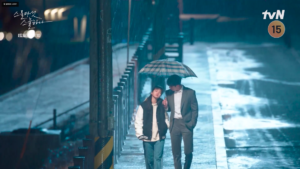
Few dramas in recent memory have had a stronger start than Twenty-Five Twenty-One, which follows Korean fencer Na Hee-do’s (Kim Tae-ri) rise to the top starting at age 18 and how her life intertwines with a 22 year-old Baek Yi-jin (Nam Joo-hyuk), who becomes a journalist later in the series after dealing with the fallout of the 1997 IMF financial crisis.
However, such a promising first half raises the question: how long will such strengths last? As expected, Twenty-Five Twenty-One maintains the potent writing it had already established to depict realistic situations in friendship, love, and life for each of its characters until almost its very end. But, by episode 15, the writers seem to throw nearly everything they’ve built up so robustly — characterization, plot, and themes — out the window to assemble an ending that leaves more questions than were originally introduced in the first place.
This review contains spoilers.
Before the plot reaches its bittersweet and puzzling ending, however, the writers initially set up a major challenge for themselves: To carefully and realistically depict the anticipated transformation of Hee-do and Yi-jin’s relationship from platonic to romantic considering the characters’ age difference. Luckily, they ultimately succeed throughout the drama’s latter half.
Naturally, by episode 9, Hee-do struggles to define and deal with the cloudiness of her relationship with Yi-jin as their chemistry and tension reaches an all-time high. She admits to him that she likes him, but that she envies him too, in his newfound success as an adult with a full-time job — something that she still can’t have as a high schooler, even though she has already seen ample success in her fencing career. However, by the end of the same episode and beginning of the next, Yi-jin dispels some of Hee-do’s confusions by telling her that he loves her (still seemingly platonically) as she always leads him to a good place, and that he doesn’t expect any response to his confession in return.
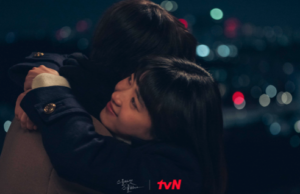
As the story progresses and develops from episode 9 and on, so does Hee-do’s and Yi-jin’s relationship with one another, transitioning from a pure, heartwarming friendship into a romantic one through their ages of 21 and 25, respectively. In the first half of the show, the drama’s title seemed to suggest the ages at which Hee-do and Yi-jin fall in love with one another–and that becomes true in some ways–but in the end, it leads to the complete opposite of outcomes.
Yi-jin’s confession of love is as heartwarming as it is mature, and in response, the writers make Hee-do’s reaction sensible, authentic, and true to the character they’ve created for her thus far. She appears giddily flattered, but admits that her feelings aren’t that big right now and that she’s not completely sure how she feels. Yi-jin is understanding of her answer, and the two continue as they have, in a supportive, emotionally mature friendship, with little moments of romantic tension here and there.
That all comes to a head in episode 12, when Hee-do kisses Yi-jin seconds before the world enters a new millennium and the year 2000, out of fear that the world may actually end due to the so-called “Y2K bug.” Yi-jin visibly does not react, and does not kiss her back. Instead, he attempts to ignore her completely for days and even weeks after the moment transpires, fearing that any romantic involvement in their relationship will ruin what they have for good. Despite the events that unfold after, the scene in which Hee-do decides to kiss Yi-jin is a standout in the drama, as the writers put their poignant words to good use during her narration to explain her decision:
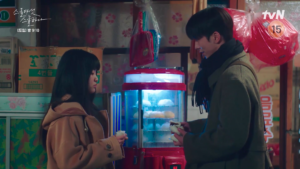
“The kiss that started when I was nineteen ended when I was twenty. It was now a new year and a new century. I guess I wanted a change for myself.”
Although the ringing in of the new year signifies Hee-do’s official entrance into legal adulthood–whether or not she was ready for it–the writers give her the necessary words to make apparent that she enters this transition of her own volition. This narration also marks the point at which the realism and realistic situations already prevalent within the show’s narrative increase further. This strikes a parallel with the moment in life itself when one transitions from their late teenage years to some form of true adulthood.
At this point in the drama, the more lighthearted, hysterical moments begin to disappear, and each character’s lives and the situations they are in become more real and raw than they ever were before. The writers immediately bring this to fruition when they maintain and perhaps even heighten the authenticity and realism of Yi-jin’s situation. He becomes fearful that his relationship with Hee-do may ultimately crumble if it were to enter romantic territory, and that he would be unable to maintain his objectivity as a sports reporter. Yi-jin ultimately decides he does indeed want to pursue a romantic relationship with Hee-do, just as Hee-do indicates to him first, and later transfers out of the sports department and into the local news department to maintain his distance as a journalist.
Twenty-Five Twenty-One’s harsh but accurate depictions of the reality of adulthood reaches its peak in episode 14, arguably the standout episode of the drama. Most of the episode centers around Yu-rim (WJSN’s Bona): in a newscast from 2009 in which Yi-jin interviews Hee-do after her third gold medal win, it is revealed that Yu-rim had transferred to the Russian team by no later than 2001. The episode then flashes back to February 2000 — Hee-do and Yi-jin are happily dating, but Yu-rim and her family are still dealing with the same financial troubles that have plagued them since the onset of the IMF crisis. Those troubles soon turn to irreparable when Yu-rim’s father accidentally crashes his truck into another oncoming car, finding himself and his family unable to pay for the victim’s medical bills and therefore avoid jail time.
In order to relieve her parents from having to sell their shop, Yu-rim decides to change her nationality to Russian, as she’s been offered enough money by the country’s fencing team to make the switch and cover her father’s expenses. While the previous episodes were far more buoyant and spirited in tone, episode 14 marks an even wider and more apparent separation between the brightness of youth and the realities of adulthood, even for Yi-jin. Still a reporter in UBS’s sports department at this point in the drama, Yi-jin must report on Yu-rim’s decision to change her nationality from Korean to Russian “for money,” as she asks him not to disclose her family’s situation. Following Yi-jin’s broadcast, Yu-rim faces a weighty amount of criticism from the public on her decision, and Yi-jin can’t help but blame himself for the inevitable, heartbreaking outcome.
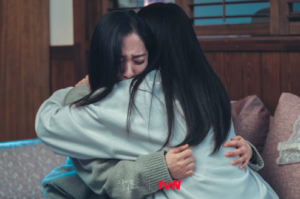
However, as Yi-jin and Hee-do still have not yet reached the titular ages of 25 and 21 by the end of episode 14, this pacing results in the final two episodes and closure of the narrative being completely rushed. The strong characterization and realistic plot that the writers have built up through this point in the drama are ultimately thrown completely to the wayside by its end.
By the middle of episode 15, Yi-jin’s and Hee-do’s relationship is not entirely unexpectedly on the verge of falling apart. As Yi-jin becomes busier with his work in the local news department at UBS and Hee-do becomes busier with her fencing schedule, the two have trouble finding time for one another. In a complete blow to their relationship, and perhaps to the entire narrative thus far, the writers surprisingly choose to incorporate the events of 9/11 directly into the plot. The day Yi-jin and Hee-do are set to celebrate their 600-day anniversary and take a trip out of town also happens to be September 11, 2001, and Yi-jin is flown out to New York the next morning to report on the situation out of UBS’s office in America.
This quickly becomes the catalyst for the pair’s ultimate, prolonged breakup in the show’s final episode. As Yi-jin continues to be stationed in the United States for weeks, then months, following the attacks, the distance begins to grate on his and Hee-do’s relationship. Meanwhile, Hee-do still continues to send him support from the fencing training center each and every day. In a somewhat out-of-character move from the Yi-jin we have come to know, he decides to apply to work as a foreign correspondent in UBS’s New York office. He is awarded the position, putting the nail in the coffin in his relationship with Hee-do.
It’s at this point in the drama when the characters of Yi-jin and Hee-do that the writers have so strongly crafted thus far begin to lose their familiarity. From the moment they meet until the introduction of this particular plot point, Yi-jin and Hee-do are two characters who believe they can get through anything, whether together or apart. However, when they break up in their famed tunnel meeting spot, Hee-do claims that they were only good for each other “during the good times,” and Yi-jin agrees, mutually agreeing to part ways for good. Perhaps this is the point the drama strives to get across: that youth and love can’t last a lifetime, and are only so fleeting and lasting until their purpose has been served. But if it is, that message gets muddled and mostly lost in translation by how the writers choose to seal Yi-jin’s and Hee-do’s collective fate.
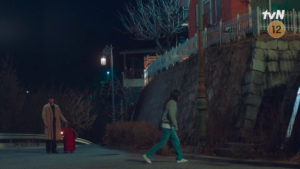
Considering how near-flawless Twenty-Five Twenty-One’s writing had been up until its very end, the portrayal of the final scene ultimately falls flat on the delivery. When Yi-jin and Hee-do deliver their final messages to each other — what they wish they had said during that moment in the tunnel when they ultimately break up — their words feel far more surface-level than any they had exchanged throughout the series. On top of that, the final moments almost introduce more questions than answer any of those that were introduced previously. Who Min-chae’s (Choi Myung-bin) father is, and who Hee-do ultimately marries–although we know it’s not Yi-jin–we will never know.
Writing issues aside, the second half of Twenty Five Twenty One still carries on several of its strengths from the first half of the series, most notably its nostalgia factor and acting from the entire cast. Sans the questionable incorporation of the events of 9/11 into the plot, Twenty-Five Twenty-One’s second half continues to excel in its palpably nostalgic and vivid depictions of the late 1990s and early 2000s. This mainly comes across in how the show incorporates technologies into how the characters communicate (or fail to communicate) throughout the narrative. The costuming and production designs continue to delineate the past and the present, again grounding the narrative in realism and authenticity.
Despite the hand they are dealt at the end, with less than stellar writing to round out what otherwise would have been a near-perfect drama, Kim Tae-ri, Nam Joo-hyuk, Bona, and entire rest of the cast — notably Choi Hyun-wook who plays Moon Ji-woong and Lee Joo-myung, who plays Ji Seung-wan — never let up on their acting. Each conquers heartwarming or heartbreaking moments, bringing about painfully tear-jerking scenes that keep viewers’ faith in the drama and its credibility afloat. If anything, it is their acting chops that ultimately keep the show genuine, even if its writing ends it on a puzzling note.
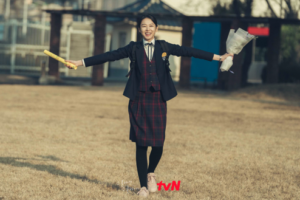
While Twenty-Five Twenty-One’s first half set big expectations for the remainder of the show, unfortunately, as with many dramas, its second half failed to live up to them in the end. That’s not to say that its successes are for nothing, however. In the end, Twenty-Five Twenty-One is still at the top of its class in emulating a discernible, practically tangible feeling of bittersweetness that life is all about.
(Images via tvN.)


